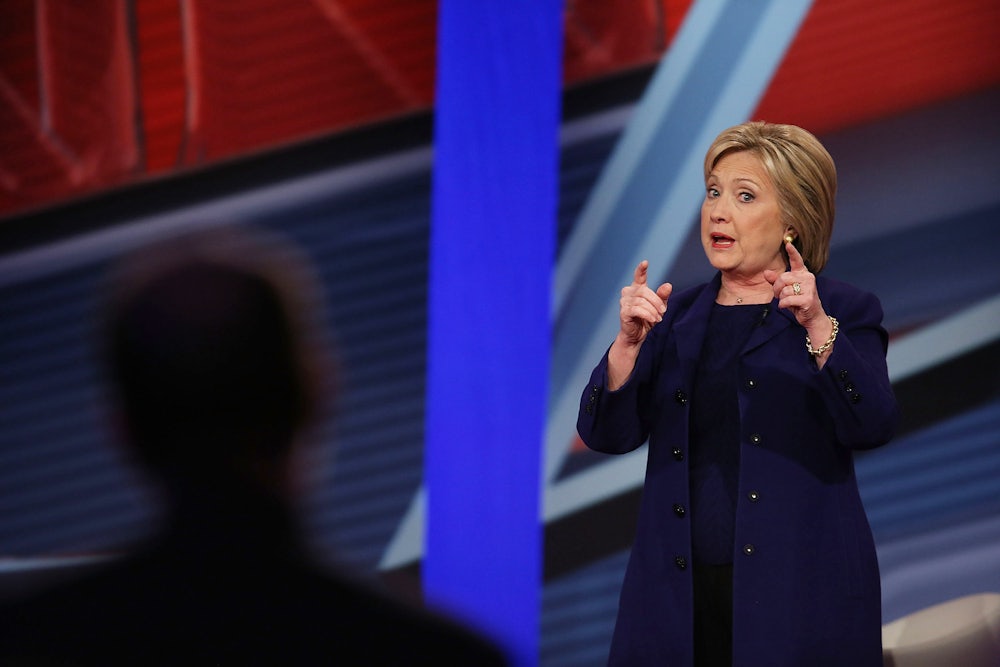After her paper-thin victory over Bernie Sanders in the Iowa caucuses, it’s abundantly clear that Hillary Clinton has a problem with young voters. According to entrance polls, Sanders received 84 percent of the vote from those 17 to 29 years old, as against 14 percent for Clinton. Sanders won a smaller but still lopsided victory among those 30 to 44 years old, where his 58 percent dwarfed Clinton’s 37 percent. It was only among voters 45 and older that that Clinton found a friendlier demographic. To put it another way, the vast majority of Clinton supporters were born before Neil Armstrong stepped on the moon. The good news for Team Clinton is that, based on her performance in the CNN-sponsored town hall last night, she’s honing her cross-generational pitch heading into tonight’s one-on-one showdown with Sanders.
There is no consensus on why Clinton has failed to connect with younger voters, but one problem might be that her pitch is a very personal and pragmatic one: that she’s a progressive who gets results. This might resonate more with voters who actually remember her years of political activism. For most young voters, Clinton’s experience counts less than Sanders’s energetic agenda. And Sanders has been more aggressive in courting young voters, making the case for free college tuition, which Clinton objects to, preferring more targeted policies of making in-state college cheaper and offering lower rates. What Clinton needs is an agenda of her own, tailored to the particular economic problems and anxieties that millennials face.
At least Clinton’s newfound focus on young voters stands in contrast to the attidues expressed by some of her ardent supporters, who continue to address the young in a condescending manner that hurts their cause. A prime example of the genre is a snooty New Yorker article by Alexandra Schwartz which portrayed support for Sanders as a hipster affectation, comparable to sporting a handlebar mustache:
I sense a whiff of historical fetishism in the young love for Bernie, a yearning for an imaginary time of simpler, more straightforward politics that aligns with other millennial tendencies toward false nostalgia for past purity, in fashion or food, for instance. The obsession with the banks and the bailout is itself phrased in weirdly retro terms, the stuff of an invitation to a 2008-election theme party. As my colleague Ben Wallace-Wells points out, we voters under thirty have come of political age during the economic recovery under President Obama. When I graduated from college, unemployment was close to ten per cent; it’s now at five. Sanders’s attention to socioeconomic justice is stirring and necessary, but when his campaign tweets that it’s “high time we stopped bailing out Wall Street and started repairing Main Street,” you have to wonder why his youngest supporters, so attuned to staleness in all things cultural, are letting him get away with political rhetoric that would have seemed old even in 2012.
Schwartz’s article is misbegotten both in tone and facts. Tonally, it says little more than, “Grow up, Sanders supporters, just grow up.” This is not a persuasive way to talk to people whose minds you want to change.
As economist Dean Baker notes on the blog for The Center for Economic and Policy Research, Schwartz completely ignores the fact that the relatively good unemployment numbers are belied by the fact that many people, including the young, have dropped out of the labor market. “The employment rate of prime age workers (ages 25–54) is still down by 3.0 percentage points from its pre-recession level,” Baker notes. “Furthermore, this drop is for workers at all levels of educational attainment. Employment rates are even down for workers with college and advanced degrees.” The unemployment rate for those age 20-24 is 9.4 percent, which, coupled with enormous tuition and college debt, might explain why Sanders is so popular with this group.
If Hillary Clinton took Schwartz’s blase and superior attitude toward lecturing the young on economics, she’d never improve her chances with this group. Fortunately for the Clinton campaign, its candidate shows every sign of being aware that young people have genuine economic grievances that need to be addressed.
During last night’s town hall, an exchange with host Anderson Cooper gave Clinton a chance to road-test new language to appeal to young voters. “Here’s what I want young people to know,” Clinton said. “They don’t have to be for me, I’m going to be for them. It doesn’t really matter if they are not supporting me, I will be their president, I will do everything I can to give them the opportunities they deserve. ... As I speak with young people across the country in Iowa, New Hampshire, and elsewhere, I do sense this real feeling of being somehow disadvantaged, put on the wrong side of American opportunity. And I understand that.”
Clinton’s response wasn’t the full answer she needs to give; it’s too vague, and talking about the young as “disadvantaged” doesn’t come to terms with with the specific economic challenges that they face apart from the rest of the population. But it is the beginning of a pitch that could work. The fact that Clinton has indicated that she is listening to the young is a first step, but now she needs to come up with policies that can compete with the more popular agenda that Sanders has put forward. She should use tonight’s debate to expand on her message for younger Democrats, but going forward, she’ll need to go beyond rhetoric and do more work on the policy front to make a truly persuasive case.
